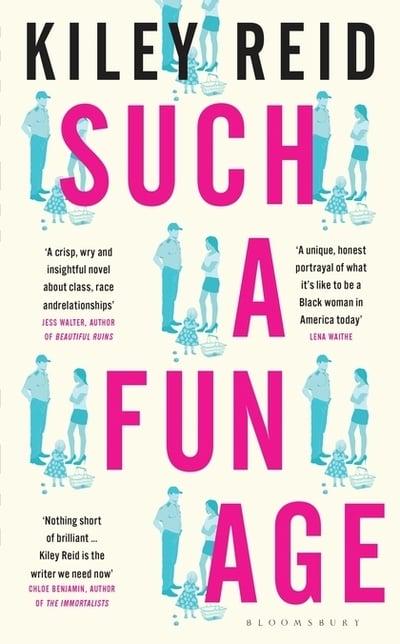Book Review of Kiley Reid's Such A Fun Age

As a rule I wouldn’t comment on a book cover, but the sleeve of Such a Fun Age really pulled me in. Jojo Moyes’ comment “I couldn’t put this down” promoted its accessibility. In addition, the positive comments from both the Times “A new literary star” and the Guardian “A firecracker debut” added to its appeal. The story Such a Fun Age lived up to its promise. I wasn’t disappointed and hope this reaches the Booker prize shortlist.
In Such a Fun Age the issues of what it means to be racist, who is and isn’t racist, why and how this might manifest itself is tied up in an exploration of messy real life. As such it is a fascinating read.
Context is significant in Such a Fun Age and at a time when the ‘Black Lives Matters’ campaign is making readers like myself question our own self-awareness regarding white privilege, I found myself being quite self-conscious as I read along. Normally I would simply immerse myself in a text and respond to it naturally and with confidence in my views regarding character, theme and plot.
When reading Such a Fun Age, however, I was questioning my own responses as someone experiencing ‘white privilege’ and trying to be reflective of this as I read from the perspectives of the key characters. Interestingly, Kiley Reid actually refers to raising awareness about racism in our current society within the story itself.
Regarding the plot: in brief, the main protagonist Emira is a black twenty something graduate, living in Philadelphia who is moderately disenchanted with her life. Working as a babysitter she feels left behind, earns little, but knows she is great at her job. She has a firm affection for Briar, the toddler for whom she cares, Briar is the daughter of seemingly successful and woke Peter and Alix. They are not necessarily quite all they seem and one evening they call Emira and ask her to take Briar to the mall following a disturbance in their own home. This leads to Emira being accused of kidnapping Briar and thus unleashes an unexpected chain of events during which the reader can reflect upon and challenge aspects of all the key players’ motivations and beliefs. Things come to a head when we learn that Emira’s current white boyfriend Kelley had been Alix’s first love. The relationship had ended badly with Alix being presented as racist during her time in school.
Part of the reason for responding to Such a Fun Age with some element of self-doubt is that it doesn’t present characters that are archetypally villains or heroes, so is constantly demonstrating that we can all make errors of judgement whilst not being fundamentally ‘bad people’. Each character has flaws and all have some redeemable characteristics. Race is the central theme explored in the text and yet, at the same time, it almost isn’t. It is as if ‘colour’ is an external theme to which the characters all react. In Renni Eddo-Lodge’s Why I’m No Longer Talking to White People about Race she talks about how it is only white privileged people who make the claim of everyone being at the same starting point in life. Kiley Reid’s Such a Fun Age proves the validity of this claim. The text is continuously presenting the actions of the different characters within a justified framework which seems legitimate to themselves. It is for the reader to either accept or refute the legitimacy of that claim. The central example of this is when Alix loses her virginity to Kelley, but almost immediately afterwards calls the police when his black friends arrive at her house. This can seem legitimate to her, but of course her narration of the events is just one narrative and not necessarily a reliable one.

Book Discussion Questions on Such a Fun Age
thebookerprizes.com/fiction/2020To what extent is it possible to read Such a Fun Age without being self reflective about how your own race, wealth or class have influenced your own life?
What are the main flaws in Alix’s character?
What are your views on why Kelly and Emira don’t reconcile once he is proven to be basically ‘right’ about Alix?
It is when Emira realises that she is the only one of her friendship group who is still on their parents’ health insurance policy that she reflects on her lack of financial and career success. She knows that she is being ‘left behind’ yet doesn’t seem to be able to quite do anything about her prospects. What are the factors stopping her becoming richer and more successful?
Which of the characters in the book do you most identify with and why?
What are the reasons for Alix’s ‘friendship crush’ on Emira?
In the story Such a Fun Age we see the significance of ‘first love’ and how it can affect a person’s whole future. We also see how unreliable personal narrations of first love can be. How much, if any sympathy do you have for Alex as a teenager? Can she be forgiven for calling the police?
In the story, Kiley Reid comments that Kelly gravitated towards black cool kids at school and that he always has black girlfriends. Reid has Emira express how grown up she feels having an older white boyfriend who doesn’t buy his furniture from Ikea. Discuss what this reveals about Emir, Kelley and society at large.
Both Kelly and Alix wanted to share the video of the racist incident involving Emira and Briar in the grocery store even though Emira doesn’t want to. What are their motivations for wanting to put the video on social media?
Both Alix and Emira rely a lot on their female friends for companionship and validation of their life choices and decisions. Do you think their friends let them down at any point in this story?
Is it possible to argue that Alix truly believed that she was genuinely helping Emira by sharing the video clip?
Peter is probably the least ‘fleshed out’ character in this story. Discuss whether any significance should be attached to this.
Discuss the importance of the final line of Such a Fun Age “Emira would carry the dread that if Briar ever struggled to find herself, she’d probably just find someone to do it for her.”
Kelly and Alix both assume that they know what is best for Emira, regarding how she should respond to the racist attack on her in the shopping centre. Discuss.
The exploration of racism and prejudice are dominant themes in Such A Fun Age. What other issues are also significant? How do they manifest themselves?
Discuss what you understand by the term ‘white privilege’. Review how it is central in the story Such a Fun Age.
Can Alix’s growing awareness of her own ‘white privilege’ be used as any kind of excuse for her errors of judgement?
Alix accuses Kelly of being racist. Is he? Discuss.
Would you like to see this book win the 2020 Booker Prize? Why or why not?
Bookclub Questions on Kiley Reid's Such a Fun Age (If you haven't read the book!)
The initial incident in the shopping centre where Emira was accused of kidnapping Briar was the result of a suspicious white shopper who jumped to outrageous conclusions based on various prejudices and assumptions surrounding not only race, but also class, wealth and appearance. Do you have incidents of friends being similarly wrongly judged simply because they are not white and/or other assumptions? Alternatively are you prepared to admit instances of when you have jumped to conclusions based on prejudices and assumptions that you may have?
How aware are you of what ‘white privilege’ is and what it means?
When writing these questions I felt very self-conscious, as a white middle-aged woman, about whether they are appropriate or whether I am revealing any unconscious prejudice that I might have. I would hope I am not racist, yet not having experienced racism myself makes me cautious about commenting about it. How comfortable are you discussing issues of race?
Have you read Why I’m No Longer Talking About Race? Did you find it a valuable read? Why or why not?
How important is an individual’s nationality or cultural background when interpreting text?
Further Comment on Kiley Reid's Such a Fun Age
Whilst the issues explored in Such a Fun Age can never simply stop mattering and Emira’s life journey doesn’t suddenly stop, the story does have a definite end. Loose ends are, by and large, tied up which is quite pleasing for the reader. On one level, Such a Fun Age is an easy read. The writing style is enjoyable and has a light touch that pulls the reader in. On a different level though the book is a challenge and raises as many questions as it answers. The complexity of this really appealed to me.